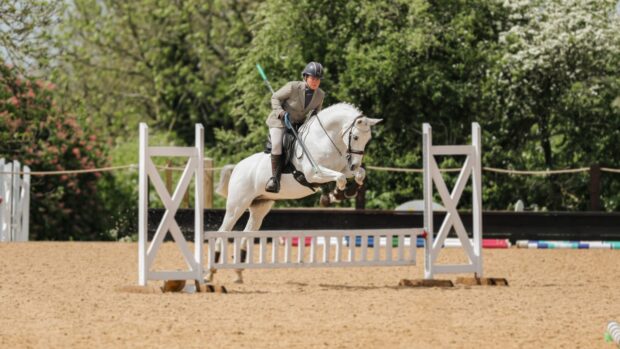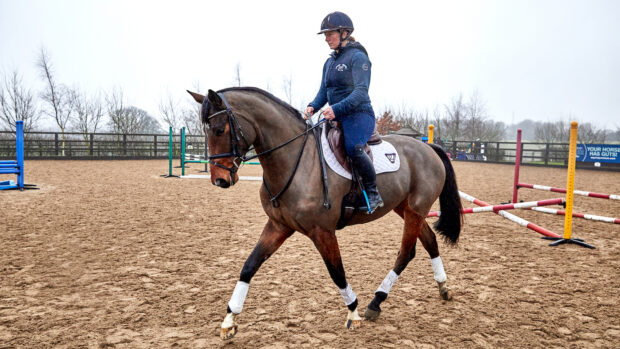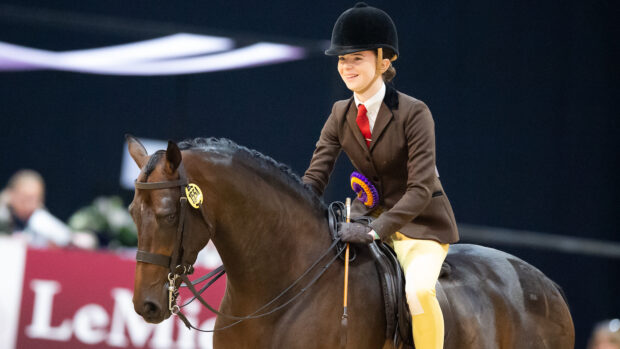From owning a bolter that she didn't have the confidence to mount, to winning her first novice championship, the route has been a satisfying learning curve for Leanne Johnson from Leicestershire
There’s nothing quite so disquieting as not having confidence in the horse that you are riding.
“When I first got Darkie, he hadn’t done much and kept bolting because he had no trust in the rider,” Leanne Johnson told H&H.
For this reason, Leanne had stopped riding the 9-year-old part-cob gelding when along came trainer Laura Jarvis.
“It wasn’t until Laura sorted him out that I felt confident to get back on him.”
And that confidence is obviously paying off, as for the past year the pair have been successfully competing in affiliated dressage and at the beginning of October they won the novice restricted championship at the Petplan Equine Area Festival, Lincs (report, H&H 17 October).
“When I look back from what we’ve achieved now, those days seem like distant memories, but I really couldn’t have done it without Laura’s help,” says Leanne.
So we asked Laura just what it is that they have been working on and about her training philosophy.
We began by asking how she worked on building up the trust between horse and rider?
“Speaking to Leanne and hearing what Darkie had been doing, it felt like there had been some sort of trauma. Even when he was standing on the ground, if you touched him behind the saddle he became nervous and flinchy.
“This is the sort or reaction that I would expect from a horse that has dragged a rider following a fall.
“My strategy was to take plenty of time and proceed really gently. I didn’t clank about him and was careful not to kick him by accident. But he did bolt with me the first time I got on him.
“We did 2 laps of the arena! I was very careful to stay in balance, not tipping forward in the saddle, and let him have a good canter around. As soon as he realised I wasn’t panicking, he relaxed and came back to working normally.
“I think for Leanne to watch that and see that it was fine, gave her a lot of confidence. I talked to her about what she thought would happen if he did take off with her, that it was not the end of the world and that they were in the secure environment of the ménage. I don’t think he ever bolted with her again.
“She had been in a vicious circle, he reacted, she panicked and gripped with her legs and this had a knock on effect. Leanne was an experienced rider with a fairly secure seat but her balance wasn’t always brilliant and I think that was a bit of what was causing the issue.
We began with lots of really basic work to get him used to me and then Leanne. Then we worked on Leanne’s lower leg position, getting it in the right place to support her upper body. We did loads and loads of transition work making her feel as though she had the control. She quite quickly built up confidence.”
Laura’s tips if you’re working with a bolter:
1. Try and keep the head up. If they can get their head down, they can bronk more effectively.
2. Try to sit up and not let your position collapse forward.
3. Try to find a circle. Bend the neck to gain a bit of control so that they don’t gain speed.
“Darkie is quite a sharp horse, but it’s a manageable sharpness.
“To get this under control we’ve been working on loads and loads of 20m circles, spiraling in and out again. This helps him to learn to become less sensitive to the leg. To slow his reactions down we’ve been doing lateral work — shoulder-in and leg yield.
“A favourite exercise is to do shoulder-in down the long side, riding walk to trot transitions. The angle stops the horse running away and the transitions make the rider use the leg more.
Basically we’ve just improved his general rideabilty, getting Leanne “inside” him and not perched on top with her legs sticking off the side.”
What’s your USP?
I’m quite open minded as a trainer and my pupils have told me that they find it easy to approach me and say when they are not sure. Sometimes it can be quite daunting having a lesson and a rider will say yes, even when they don’t quite understand or disagree.
What’s your pet hate?
Forcing things on a horse and making it do something. I try to work in a way with which both the rider and the horse are happy.
Share with us your signature exercise?
My favourite at the moment is spiraling in and out of a circle, really thinking about control. Don’t let the horse fall in or out and maintain suppleness and control at the same time. I do this in trot and canter mainly, sometimes leg yielding back out.
What’s the best bit of advice you’ve ever been given?
David Hunt told me to do everything you do with confidence — don’t continually question yourself. If you’re continually not sure, horses sense that.
If we were to ask your pupils, what’s the one thing they’d say you always shout?
Watch the straightness!
For more information about Laura, who is based near Melton Mowbray in Leicestershire, visit www.laurajarvis.com
Read all our latest training articles



